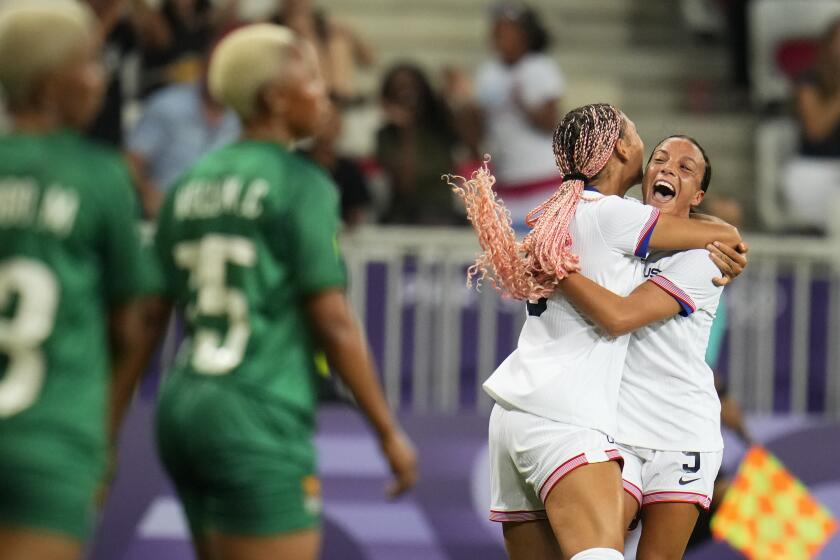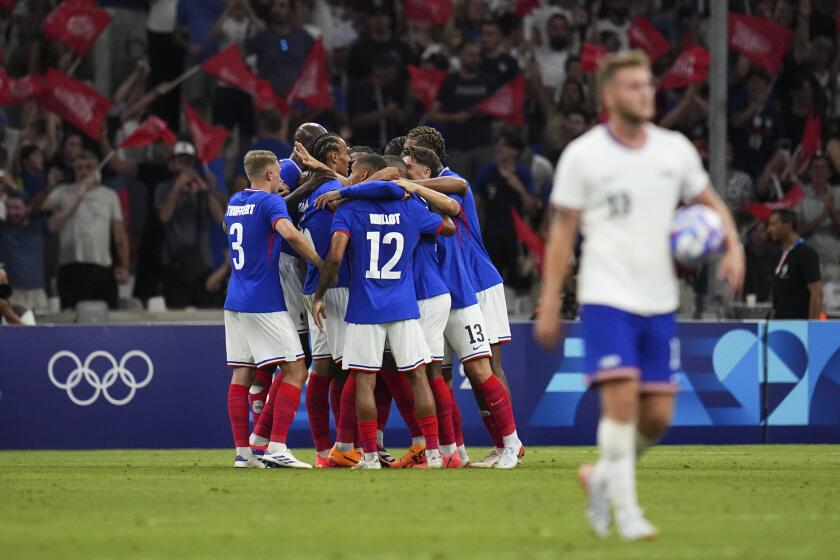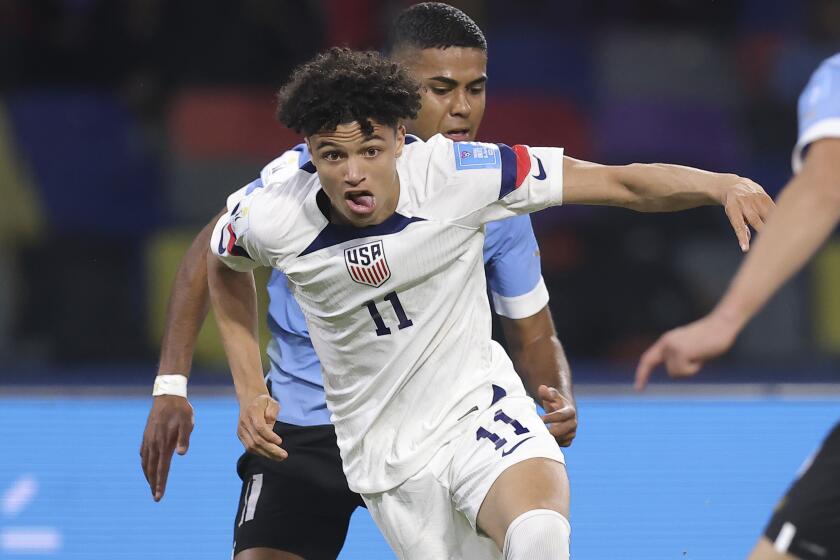Soccer ‘Boycott’ Really a Lockout : Atlanta Games: Gabarra says top players aren’t in Olympic training camp because U.S. Soccer canceled their tickets.
One of the United States’ leading women’s soccer players denied Wednesday that she and eight teammates are boycotting the Olympic training camp in Chula Vista, saying that U.S. Soccer is to blame for their not being there.
Carin Jennings Gabarra, the most valuable player in the 1991 FIFA Women’s World Championship in China and now women’s coach at Navy, also ridiculed federation claims that the nine players are demanding more lucrative contracts.
“If we could be in training camp right now, we would be,” Gabarra, originally from Palos Verdes, said from Maryland. “Every one of us would be on a plane there [to California].
“We didn’t go into camp because they [U.S. Soccer] canceled our tickets.”
On Tuesday evening, the federation issued a news release saying that the nine players, each of them likely starters on the Olympic team, had rejected individual contract offers and would not be attending the camp, which runs through Dec. 14.
The news release made no mention of canceled airline tickets, but Hank Steinbrecher, U.S. Soccer’s executive director, acknowledged Wednesday night that that was the case.
“That’s absolutely correct,” he said. “I do not see the wisdom in paying [for these players’] to go to California to take a vote on whether or not they should play.
“That should have been done long before this. This camp is for people who have come to agreement with the federation. They have not.”
The 18 players who reported to camp Wednesday are not under contract and are being paid a per diem.
Gabarra also denied that the nine players, seven of them starters on the ’91 world championship team, are seeking more money, as Steinbrecher had suggested.
In addition to Gabarra, the nine players are Michelle Akers, the United States’ all-time leading goal scorer among men or women; UCLA women’s coach Joy Fawcett, Julie Foudy, Mia Hamm, Kristine Lilly, Carla Overbeck, Briana Scurry and Tisha Venturini.
“We did not ask for any additional funds that were not promised in the agreement for 1995,” Gabarra said. “We did not ask for any additional money.”
Asked about Steinbrecher’s comment Tuesday that the federation does not “award mediocracy” and remains unwilling to give the U.S. players bonuses for winning a silver or bronze medal in Atlanta, Gabarra reacted angrily.
“Don’t even ask me about that,” she said. “I don’t want to talk about that.
“It’s not a money issue from our side. We did not ask for any additional funds. We just hope that U.S. Soccer is as committed to putting the best team on the field in the ’96 Olympics as we are committed to winning them.
“All there’s ever been for us the last 10 years that most of us have played for the national team is commitment to the game and to our team and to the country.”
But Steinbrecher Wednesday night reiterated his stance and said only a gold medal will earn the players a bonus.
“First of all,” he said, “I can’t believe that our women are even thinking about finishing third. We’ve been in negotiations for more than three months. In that period of time . . . we increased the bonus from $200,000 to $250,000 but said this is to win. It’s everything to win.
“They are heavily favored. They are playing at home. It’s only an eight-team field. The team that has given them the most trouble [world champion Norway] is in the opposite bracket. Anybody who is even thinking about finishing third shouldn’t play. We don’t think we should reward that.”
Ellen Zavian, an attorney for the nine players, said U.S. Soccer had given them a Dec. 5 deadline to accept its contract offer, which would have covered the entire team.
“Leading players did not want to be forced to make a decision that would affect the whole team,” she said, explaining that the deadline, on the eve of Wednesday’s camp opening, did not allow the players a chance to discuss the matter with each other.
“How can we nine decide an agreement for a whole team?” Gabarra said.
But Steinbrecher said money is the real sticking point in the dispute.
“We sent them their contracts,” he said. “They sent them back signed but with two clauses crossed off. The two clauses had to do with the bonus pool and with a written guarantee for a percentage of prize money [in other tournaments].
“We can’t do that because if we do we’ll have to do that for every one [of the U.S. national teams] and it could significantly impact our budget. We’re not prepared to do that.”





